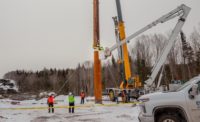Federal Judge Upholds New York City Building Natural Gas Restriction

Manhattan federal judge upholds New York City Local Law 154 setting emission restrictions on gas connections new construction of seven stories or less in challenge by plumbers union and contractor groups
Image: Wikimedia Commons
By dismissing a lawsuit filed by state and local plumbing and building trade groups, a federal district court judge in New York City has allowed continued enforcement of Local Law 154, the city’s building electrification law, which currently sets policy on emissions of natural gas connections in most new structures of seven stories or less.
In her 16-page ruling on March 18, Judge Ronnie Abrams of the U.S. District Court in Manhattan dismissed the complaint with prejudice and has allowed the city to enforce the policy in effect since 2024, which is set to apply to buildings taller than seven stories in 2027. The city council approved it in December 2021 as a way to help meet city carbon-neutrality goals.
Filling the suit was Local 1 of the plumbers and pipefitters union in North America and contractor groups that include the Plumbing-Heating-Cooling Contractors National Association, the Association of Contracting Plumbers of the City of New York, New York State Energy Coalition, Plumbing Foundation City of New York Inc. and Building Industry Association of New York City Inc.
The plaintiffs contended that the U.S. Energy and Policy Conservation Act of 1975 can stop cities and states from banning gas use in new construction, preempting Local Law 154. The city moved to dismiss the suit, countering that the law does not concern energy use.
Abrams said Local Law 154 sets indoor air emissions limits for fossil fuel combustion in new building construction, of “any substance that emits 25 kilograms or more of carbon dioxide per million British thermal units of energy.” According to an analysis by Vincent Nolette, a fellow of Columbia University's Sabin Center for Climate Change Law, “this indirectly prohibits installation of natural gas appliances, compelling developers to install appliances like induction burners and heat pumps.”
He says the New York City law is different from one in Berkeley, Calif., which set a wholesale ban on natural gas piping and was challenged by a restaurant trade group in 2023 and ruled illegal when appealed to a San Francisco federal appellate court.
“Judge Abrams’ decision is reasonable, and we agree with it,” said Nicholas Paolucci, a city spokesperson. "Congress plainly did not intend a statute governing appliance efficiency standards to require that cities continue using fossil fuels.”
“We plan to appeal,” attorney Sarah Jorgensen, who represents the plaintiffs, told ENR. “We had assumed that this case and the case against New York State would likely end up before the Second Circuit [appellate court].” She also represented the California Restaurant Association, which challenged the Berkeley ordinance.
“This decision demonstrates that building decarbonization laws that focus on performance standards rather than outright bans are on strong legal footing, especially when considered alongside other successful local performance-based building decarbonization laws,” says Nolette.
Mike Elmendorf, president and CEO of the Association of General Contractors for New York, declined to comment.





